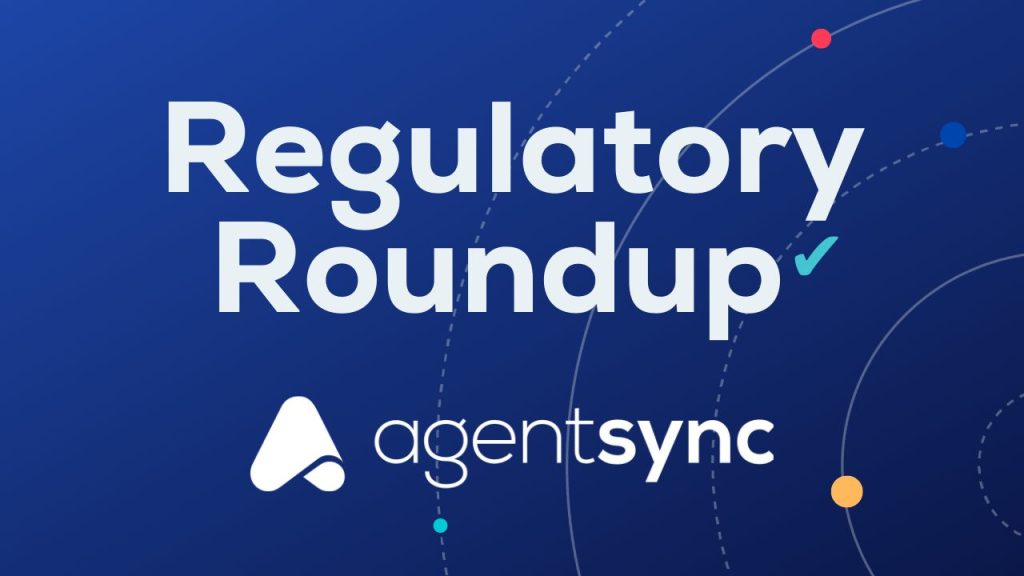Regulatory Roundup: DHS Adjuster Licensing, Pandemic Regulatory Catchup, Idaho Joins SBS
State by state variations of laws, compliance protocols, industry transparency, and general regulatory cultures can lend one the impression that keeping up with industry changes is a little bit like herding cats. So, what better way to wrangle some of the more localized insurance news than in a Regulatory Roundup?
On an ongoing basis, in no particular order or rank, we’re wrestling the various regulatory changes, compliance actions, and commissioner decisions into our roundup. As a disclaimer: There’s a lot going on at any given time in these here United States, so this isn’t a comprehensive picture of state-level action by any means. Think of it as, instead, a sample platter of regulation.
 States clarify Designated Home State allowances for licensing non-resident adjusters
States clarify Designated Home State allowances for licensing non-resident adjusters
It’s beginning to look a lot like disaster preparedness season as states issue clarifications and rule changes for adjusters and P&C insurers. Wyoming and New Mexico issued bulletins through July to clarify one particular point: when it is (or isn’t) acceptable to use a Designated Home State (DHS) for issuing a license to a non-resident insurance adjuster.
For the unfamiliar, not all states require adjusters to have a specific insurance license. So, if you want to be an adjuster who works across state lines and your resident state doesn’t offer an adjuster license, in order to get a license that other states would consider valid for license reciprocity, you would apply for a Designated Home State license in a different state.
If you use a DHS license, you’re agreeing to treat that state, the one you are “designating” as your home state, as though it were your resident state. So, for all intents and purposes, that’s where you’ll focus on compliance. Continuing education, renewal dates, license fees – all will be based on your DHS licensing state.
The bulletins issued by Wyoming and New Mexico make it clear that not all adjuster DHS licenses are equal.
“This memorandum serves to clarify when Designated Home State licenses are not acceptable. There are some states that do not require staff adjusters to be licensed. However, if a staff adjuster’s resident state offers a resident independent adjuster license and does not restrict a staff adjuster from obtaining that license, the adjuster must hold the independent adjuster license,” said Wyoming’s bulletin.
“The Office of Superintendent of Insurance will accept a DHS license for reciprocity purposes only when the individual’s home state does not require licensure as an adjuster, permit a staff adjuster to be licensed as an independent adjuster, or the individual’s home state license requirements do not meet the criteria required by the OSI to become licensed as an adjuster in New Mexico,” said New Mexico’s.
Essentially, both states are calling out instances where adjusters’ resident states don’t require the adjuster to hold a license, but don’t prohibit them from doing so, either. Essentially, they’re saying that, if you could be licensed as an adjuster in your resident state, and your resident state has reasonable continuing education and licensing requirements, you need to do that.
Regulations still catching up with pandemic changes
Thanks to COVID-19 quarantines, work-from-home and hybrid offices gained traction even in insurance. However, as we’ve talked about on this blog before, regulations have yet to catch up to the new order of highly mobile businesses.
This Regulatory Roundup includes a few changes we have to imagine are in some part due to this remote shift. For one thing, at the end of July 2022, Nebraska removed its proctoring requirement for continuing education. Previously, online self-study courses in the state required a proctor to be present to ensure licensees were keeping it all on the up-and-up during the exam.
Also in the category of post-pandemic change, the Financial Industry Regulatory Authority (FINRA) has proposed a rule that would make some exceptions for remote workers. Currently, non-branch supervisory locations are held to a standard that requires an inspection every year. The rule would make an exception for specific supervisory duties at residential locations, holding them to a triennial inspection cycle.
If that seems jargony, let’s cut to the chase: Under current regulations, a remote worker who has some kind of financial supervisory duty theoretically has to have their house inspected every year to comply with financial oversight obligations. This rule would ease that up so that they would have a lighter inspection standard every three years. The rule indicates there’s a sliding scale, too; the comptroller of a restricted firm that’s come under SEC scrutiny is probably going to have to acquiesce to some annual inspections if they work remotely.
Idaho joins State Based Systems
Idaho is joining State Based Systems (SBS). Beginning in late September 2022, Idaho’s licensing, renewals, and business contact change requests will follow SBS codes and lines of authority.
This puts Idaho in good company, considering Massachusetts changed over to SBS earlier in the year, marking a steep improvement in the state’s ease of doing business. Particularly of note, with the switch to SBS, Massachusetts appointments can now be handled with ease for those who work with vendors that synchronize data with NIPR.
Michigan shows insurance producer role isn’t for people pleasers
Insurance fraud is a serious issue, whether it results in unpaid medical bills or social inflation. And it’s often quite easy to ascribe ill intent to things like unlicensed sales or forged paperwork. However, the case of one Michigan insurance agent shows that the social dynamic of insurance sales can be its own crucible for dishonesty.
A Department of Insurance and Financial Services media release in July 2022 outlined its case against a Michigan producer. The producer’s office manager overheard the producer on a call with a prospective life insurance customer in August 2019. The customer described the process of having gone through cancer treatment, including chemotherapy, in the prior year. Yet, the office manager noted, the producer filled out the life insurance application as though the customer had a clear, cancer-free health history.
The office manager reported the conversation to the producer’s supervisor, who flagged it to the Michigan DIFS. The DIFS reached out to the producer with a letter of inquiry in December 2019, and the producer promptly responded in January 2020, admitting to having lied on the application. The producer “doesn’t like to tell people no,” said the DIFS news release.
Further inquiries from the DIFS weren’t met with any resistance or request for hearing, so, uncontested, the department concluded the producer should be punished for “using fraudulent, coercive, or dishonest practices or demonstrating incompetence, untrustworthiness, or financial irresponsibilityin the conduct of business in this state or elsewhere.” As a result, the Michigan DIFS revoked the producer’s license.
Other state regulatory changes in brief
Wisconsin announced license administrative actions (aka, license application denials or license revocations) for June, which are somewhat eye-opening in that the majority of licenses on the list were revoked for failure to pay taxes.
New York’s surplus lines association, the Excess Line Association of New York (ELANY), has updated its list of approved E&S insurers.
Georgia has added a line of authority for “Agent – Georgia Access,” effective Aug. 12, 2022, which requires some new non-uniform application questions and is only eligible for those who simultaneously hold an Accident & Sickness line of authority.
Arizona effective Sept. 24, 2022, will waive initial licensing fees for first-time insurance license applicants in the state whose family income falls at or below 200 percent of federal poverty guidelines, or who is an active-duty military service member’s spouse, or who is a veteran honorably discharged for two years or less when they apply.
Colorado amended its regulation regarding Title insurance to include a requirement that an insurer either issue a policy within 90 days or report to the Colorado Division of Insurance within 30 days that the agent or agency failed to deliver the policy.
Alabama has posted rate change requests from insurers that offer Affordable Care Act (ACA) compliant health care plans in the state, which you can view here.
Pennsylvania Surplus Lines Association issued a bulletin warning surplus lines producers that if they’re charging a fee on policies in addition to collecting a commission then they’re likely in violation of state law. (So, reading between the lines, don’t do it.)
Utah has implemented a limited line of authority for producers who want to sell pet insurance. And if you’re interested in reading up on pet insurance, we’ve got that, too.
North Carolina is converting Company/Independent Adjuster and Self-Employed Adjuster license types to license classes, with no line of authority requirement. The change is effective mid-August for those who work through the NIPR Producer Database (PDB).
Washington Insurance Commissioner Mike Kreidler’s rule banning credit scoring in insurance underwriting (which the commissioner referenced in the Commissioners’ Corner on this blog) was shot down by a court in late July. Judge Indu Thomas found Kreidler acted in good faith, but overstepped the bounds of his office, saying the issue should be decided by the legislature.
While these points of interest aren’t comprehensive, our knowledge of producer license and compliance maintenance is. See how AgentSync can help make you look smarter today.
About AgentSync
AgentSync powers rapid growth for insurance carriers, agencies, and MGAs by offering modern tools for producer management. With its customer-centric design, seamless APIs, and automation, AgentSync’s products reduce friction, increase efficiency, and maintain compliance, ultimately helping to improve the broker onboarding, contracting, licensing, and compliance processes.
Founded in 2018 by Niranjan “Niji” Sabharwal and Jenn Knight, and headquartered in Denver, Colo., AgentSync has been recognized as one of Denver’s Best Places to Work, as a Forbes Magazine Cloud 100 Rising Star, an Insurtech Insights Future 50 winner, and is ranked 88 in Forbes – America’s 500 Best Startup Employers 2022.

